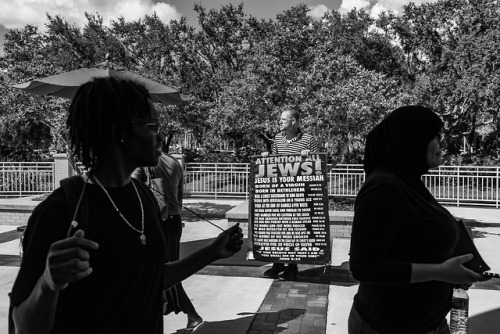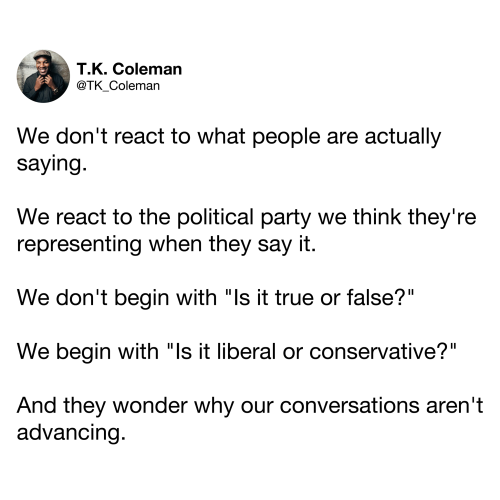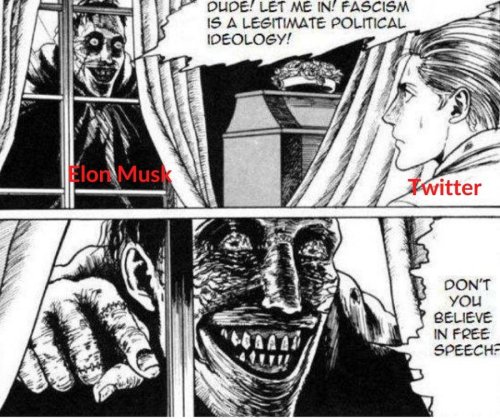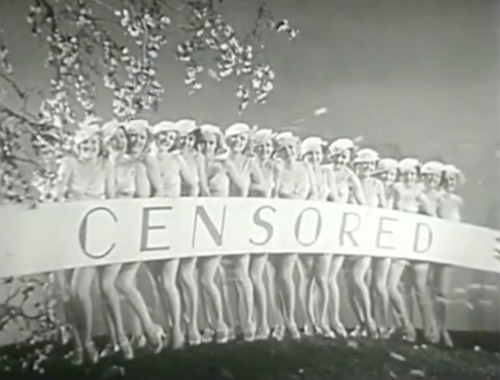#free speech
Fundamentalist preacher shouting at students on campus at Florida Southwestern State College, in Fort Myers, Florida.
Post link
Suppose you attend a stand-up comedy performance. You’re excited to listen and giggle and laugh. But unfortunately, the comic in question – let’s not mince words – bombs. The jokes don’t land, or worse, they’re outright offensive. The crowd, which started with a few half-hearted chuckles, starts to turn stony, and eventually downright ugly. Eventually, halfway through the set, the boos set in. Ultimately the comic is booed all the way off the stage.
Most of us, I think, would not view this as a successful evening – either for the audience members or the comic. But would we say the comic’s free speech rights have been violated? I doubt any of us would go that far. Free speech by no means guarantees a favorable reception.
Yet many of us – myself included – think things are quite different in the case of an invited university speaker who is “shouted down” by protesters in the audience, such that they cannot finish their talk. This is thought to represent a free speech threat. But what – and I ask this question earnestly – marks out the difference between this and the comic?
The answer typically given for why drowning out of the university speaker is wrongful is that it deprives those members of the audience who did want to hear the talk of their ability to do so. I do find this a compelling argument generally, but it doesn't to successfully distinguish the comic’s case – it is easy to imagine that somebody in the comic’s audience also wanted to see how the set would have ended.
Another possibility is that the audience for the comic did not come to the show with the intention of blocking the performance. Their anger was unplanned and organic, in contrast to the university protesters, who we suspect came to the talk knowing from the outset that they wanted to disrupt it. If this is our distinction, it suggests that there is no foul in “shouting down” a university speaker some stanzas deep into their talk, if it is the result of genuine on-the-spot negative reactions rather than a planned disruption (though how one could tell the difference, I don’t know).
Still another possibility is that a comic performance is only valued insofar as it pleases the audience, and so where the crowd turns against the performance there is no particular interest in the comic being able to continue performing. A university lecture at least nominally is not quite so hedonistic in its assessed value, and so we feel it is important that such talks be allowed to proceed notwithstanding the fact that the audience does not like what they hearing. This makes some intuitive sense to me, though it gets blurry with intentionally political stand-up comics, or university talks that are more performative than educational. I also struggle with how this accounts for a permutation of the hypothetical where a political speaker is speechifying on a public square soapbox and the crowd (while not violent) reacts deeply negatively to his speech, in a way that effectively drowns out the speaker. There, even though the talk is as “political” as a university speech, I do not tend to think there is a violation of free speech norms if the speaker ends up being drowned out. But why not?
Perhaps the answer is a lot more contingent than we might otherwise like to admit: certain spaces and events, like talks by invited speakers at universities, are ones where we stipulate heightened valuation for rules which allow for speeches to be given relatively uninterrupted in a fashion where they can be heard by any who care to listen. This is not a general rule of “free speech”; there are many other spaces where it does not apply – but the very fact that there are many other spaces where the rules are different and responses can be more “raucous” (if you will) actually serves to further justify the importance of the validity of having a space with this sort of rule. It’s good to have some known space where we can stipulate in advance that the speaker will be able to “complete their set” notwithstanding a possible hostile audience, and the fact that there are many other spaces where people are allowed to be more immediately expressive in their disdain mitigates the burden of foreclosing or limiting that sort of expression in this particular space.
Anyway, I don’t have firm conclusions here, but this is a puzzle that I had been wondering about for awhile so I figured I’d sketch some preliminary thoughts here as I work through it.
via The Debate Link https://ift.tt/ODA8MEJ
Check it out

You want free speech, you will end up to self gag with a fake smile
It’s over…
Shoot me a message if you want to keep in touch. I am going to try to keep this going as long as I can within the scope of the upcoming new rules. I can feel the ax falling on the neck of my bloggy thing.
One of the last bastions of hope for folks who are a little different is gone. If you didn’t know they’re changing guidelines here very soon. I don’t know what to do. I’m going to try to save my memes, pictures, etc for posting elsewhere. Not sure where to go next. I think it’ll be the end of Tumblr. My posts are not obscene or vulgar. I’ll admit to some likes on posts that I prefer to separate from my more wholesome/natural nudist stuff.
Ask my buddy. I said it for years under Obama. Attack the Second Amendment and you’ll lose the first. Now I don’t believe we’ve lost much in the name of firearms but, my free speech and my freedom are toast. I can’t jokingly say something is “retarded” without someone getting all sensitive and trying to check me. I don’t care. If I’m directly causing harm, ok. Otherwise, shut the hell up. Imprisoning or lodging criminal charges for misgendering someone is a violation of my free speech to say what I want. As long as I’m not threatening harm or insighting others to do harm, free speech is free speech.
The guise of a free society is falling apart and we can see the man behind the green velvet curtain. Tumblr is a free app and is a corporation. They may freely impose their will as they see fit in accordance with the law. Sort of how bakers can refuse to make a gay wedding cake. When you operate under a false pretence of openness and then you destroy it, this is real fascism.
This is what the left wingers Silicon Valley want for you. Doesn’t that make your skin crawl? Someone denying your freedoms to be weird and an individual? Sounds sketchy. I wouldn’t open a business to reel in customers and then turn my business on it’s head. I don’t think it’s ethical in the least. I don’t know where I’ll pick up but it won’t be here.
Nice knowing you folks.
… so that’s about a nude related search inquiry.
Tumblr has eliminated both direct and tag search for nude related content.
Tumblr, YOU suck so much!
Any suggestions for other censorship free social media?
I’m not sure how long this ban will be in place or if they will delete/disable all NSFW tumblrs, including my own. I don’t know where I will land, as I’m not a fan of Twitter, Flickr or others. Is deviantart still a thing? Any suggestions?
Post link
Paul Joseph Watson on EU European Commission urge for Censorship on Satire. 28 July 2021.
Voltaire’s Ghost addresses the elephant in the room. 3 April 2021.
Mark Dolan discusses freedom of speech with Toby Young. 11 March 2021.
❝It is wrong to constrain political thought, even bad political thought. And if the targets of political correctness have changed over the years, its power over what gets printed, heard, or seen has not.
This may, in fact, be more a problem now than then.
England has no written constitution, and therefore no First Amendment. But even if there had been a British Bill of Rights it would have offered no protection to Orwell in this matter.
The First Amendment does not require a publisher to print anything the publisher doesn’t want to—because publishers have rights, too. If a law were passed prohibiting the expression of certain views, it would be held unconstitutional. But political correctness is not a law. That’s why it’s so dangerous. Its victims have no constitutional protections. And even today it prevents the expression of uncomfortable truths more effectively than any statute ever could.
If Orwell were with us today, he would probably welcome the Internet blogs as an alternative to the mainstream political correctness that almost kept him from print. (He would have faulted the blogs on other grounds.)
Of course, Orwell is with us today, but that was a very close call ❞
David Lebedoff, The Same Man: George Orwell and Evelyn Waugh in Love & War, 2008
Watch “Why Free Speech Triggers The Left” on YouTube
When a Transsexual is Prosecuted for ‘Transgender Hate Crime’

On Friday 1 March, ten months of uncertainty and fear for my public reputation came to an end as a District Judge told a CPS prosecutor that the prosecution they were bringing against me for harassment under s2 of the Protection From Harassment Act 1997 was a baseless, politically motivated case and should never have come to court. I was awarded costs from the CPS, and this bizarre farce where a…









